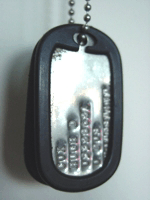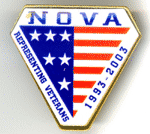
|
2411 B Charles Boulevard Greenville, North Carolina 27858 or Post Office Box 154 Greenville, North Carolina 27835-0154 |
Phone:
(252) 757-3977 Fax: (252) 757-3420 email: hughcox@hughcox.com |
North Carolina Bar Number
6567 Department of Veterans Affairs Accreditation number 8925 |
|
|
 |
The information contained in this website is general legal information and not legal advice on any legal subject. It is no substitute for the services of a
competent professional attorney experienced in these matters. This information is subject to change at any time due to new legislation or new court cases.
 |
A Short Guide about Military Veteran's Service Connected Benefits: by Hugh D. Cox I have a nationwide practice in military veterans cases for service connected VA benefits. I can represent you without having to come to my office. All communication can be by telephone. Scroll down for Valuable Information |

|
I am a founding member of the National Organization of Veterans Advocates, Inc. (NOVA) and I was on the founding Board of Directors from 1992 until 1998. Other NOVA Attorneys Representing Veterans: http://attorneys4veterans.com |
Updated
C-File Request (June 27, 2015)
This Freedom of Information Act (FOIA)
request includes the Newnan, Georgia and Janesville, WI Cover Sheet
plus
the request for ALL pages of the C-File either in paper form or digital media on
CD or DVD containing Adobe Acrobat PDF. Many Regional Offices will not send the
veteran the entire C-File unless requested under the FOIA.
Self-Reporting Forms to Help Prove Disability (Adobe Acrobat PDF Format)
Why should a disabled Veteran hire an attorney for a Veteran's disability case?
There are many advantages in hiring an attorney experienced in Veteran's law to represent you. Government statistics show that disabled veterans with attorney representation are more successful than those without. The DVA often appears unfair to disabled veterans so an attorney can be essential. An attorney may give a disabled veteran the following crucial help:
- Gather medical evidence.
- Gather evidence such as work records.
- Obtain the C-file and review it.
- Compare the C-file to the regulations.
- Get private doctors to write letters to clearly show service connected disability.
- Review prior applications to see if there is clear and unmistakable error so that prior applications can be re-opened.
- Prepare the veteran for testifying.
- Retain doctors or vocational experts to help prepare the case.
- Prepare a written brief of contentions proving disability.
- Show good reasons why you may have been late in past appeals.
- Appeal the case if denied.
- Research using a specialized law library.
What is the Department of Veterans Affairs?
What is DVA service connected Disability?
The DVA has complex regulations to determine if you are eligible for service connected benefits or Pension. These benefits are paid to people whose military service caused health problems or disability limitations. These benefits are paid for any condition which affects your efforts towards competitive work. Even if your service-connected disability is non compensable or "zero" percent, you are entitled to medical care for the service connected condition. The DVA regulations take into consideration such additional factors as additional medical care based on your medical condition. Disability means that you have a service connected medical condition which affects or prevents you from performing competitive employment.
How does a Veteran apply for benefits?
Go to your local Veteran's service representative and apply for benefits immediately if you believe you have health problems caused by military service and which are service connected. After your medical records are reviewed, the DVA Regional Office will send you a letter giving you a rating decision. Most people who apply are denied service connected benefits at this initial stage of application.
How long will a decision take?
Currently the backlog of cases within the DVA is several years, repeat, several years! Most DVA Regional Offices have backlogs of several years according to a recent study).
Should a Veteran appeal a rating decision?
Yes! The DVA may try to give a veteran a slight increase in hopes that the veteran will be satisfied. Unfortunately, many people simply give up after an initial denial. The next stage of appeal is called "Notice of Disagreement. You must give your "NOD" within one year after initial denial or your claim cannot be appealed. It can be reopened with new and material evidence. Some disabled Veterans like to have an experienced representative at all stages of application. Most people who give a Notice of Disagreement are also denied again when the Regional Office issues a "Statement of the Case" (SOC). Sometimes the Regional Office issues a Supplemental Statement of the Case (SSOC) after sending an SOC. A Veteran should submit both a Notice of Disagreement and a VA Form 9 to any SSOC - since the Regional Office rarely tells the Veteran whether the SSOC is a new issue requiring a Notice of Disagreement or whether the SSOC requires a VA Form 9. Because of the complicated and confusing time periods for appeal, a veteran should appeal every decision or adverse letter within thirty days.
Should a Veteran appeal the SOC?
Yes! Now you can appeal to the Board of Veterans Appeals (BVA) in Washington, DC using VA Form 9. After your SOC denial, you must appeal to the BVA within 60 days by filing a VA Form 9 with the Regional Office. The BVA will allow you to testify at a hearing. BVA backlogs can be several years causing further delays
When can a Veteran hire an Attorney?
Call an experienced attorney Immediately! Although a veteran can retain an attorney after his first denial for the Regional Office, the veteran should see an attorney immediately in preparation for an appeal.
How can a veteran find an attorney experienced in Veterans Law?
Most attorneys do not practice Veteran's law. The US Court of Appeals for Veterans Claims maintains a list of those attorneys who are admitted to practice before the Court. Perhaps the best indication that an attorney is experienced in the area of Veteran's law is his or her membership in the National Organization of Veteran's Advocates (NOVA) Use hyperlink: www.vetadvocates.com . See also www.attorneys4veterans.com
What does it cost to hire an attorney?
Contingency fees are limited to 20% of past due benefits by the US Code and DVA regulations. Most attorneys charge a percentage or "contingency" fee of 20 percent because most disabled Veterans cannot afford an attorney until benefits are awarded. A contingency fee means no attorney fee is owed if benefits are not awarded, however, most attorneys charge actual office expenses (such as doctor charges for medical records) even if the case is lost. The DVA may withhold 20% of past due benefits for the attorney in disability cases. The claimant is expected to pay the attorney 20% if the DVA fails to withhold benefits.
Can a Veteran ask for benefits before the date of first VA application?
Can a Veteran work and still be disabled for service-connection?
Yes. The DVA allows a Veteran with a percentage up to 100% to continue to work. If the Veteran receives individual unemployability or Pension, he cannot continue to work.
Can a Veteran receive Social Security disability benefits
and VA Veterans benefits at the same time?